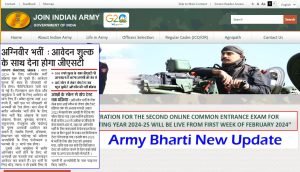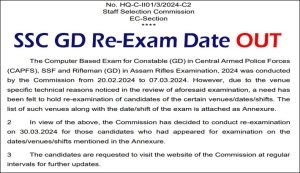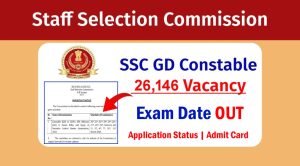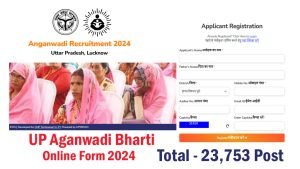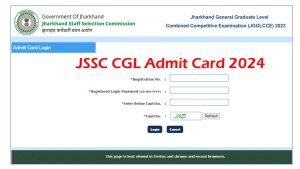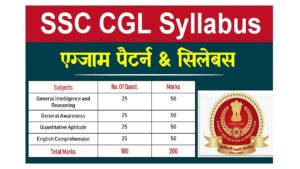SSC JE Syllabus 2024 :- SSC Junior Engineer Syllabus 2024: Are you also going to appear in the Junior Engineer exam and you have to start preparing for the exam, then you are most welcome in our article today along with SSC JE Syllabus 2024, today we will give you SSC JE Exam Pattern Will provide detailed information about 2024 also, you stay with us till the end, you will understand the whole syllabus till the end. SSC JE Syllabus 2024
SSC Junior Engineer Notification 204:- SSC JE Syllabus 2024
SSC Junior Engineer recruitment notification has been issued from 28 March to 18 April 2024. Candidates can apply online for this recruitment. Before applying for Junior Engineer Recruitment, check the information like Education Qualification, Age Limit, Selection Process, Organization Name, and Application Fee; after being found interested, candidates should apply through the official website of SSC.
SSC Junior Engineer Vacancy 2024 Details
| Organization Name | Staff Selection Commission SSC |
| Name of the Posts | Junior Engineer |
| Number of Vacancy | 966 |
| Application Mode | Online |
| Category | Govt. Jobs |
| Job Location | All India |
| Article | SSC JE Syllabus |
| Official Website | www.ssc.nic.in |
SSC JE Recruitment 2024 Post Name :-
| Department | Trade |
| Border Road Organization BRO | Civil / Electrical / Mechanical |
| Central Public Works Department CPWD | Civil / Electrical / Mechanical |
| Central Water and Power Research Station | Civil / Electrical / Mechanical |
| Central Water Commission CWC | Civil / Mechanical |
| Directorate of Quality Assurance Naval | Electrical / Mechanical |
| Farkka Barrage Project | Civil / Electrical / Mechanical |
| Military Engineer Services (MES) | Civil / Electrical / Mechanical |
| National Technical Research Organization (NTRO) | Civil / Electrical / Mechanical |
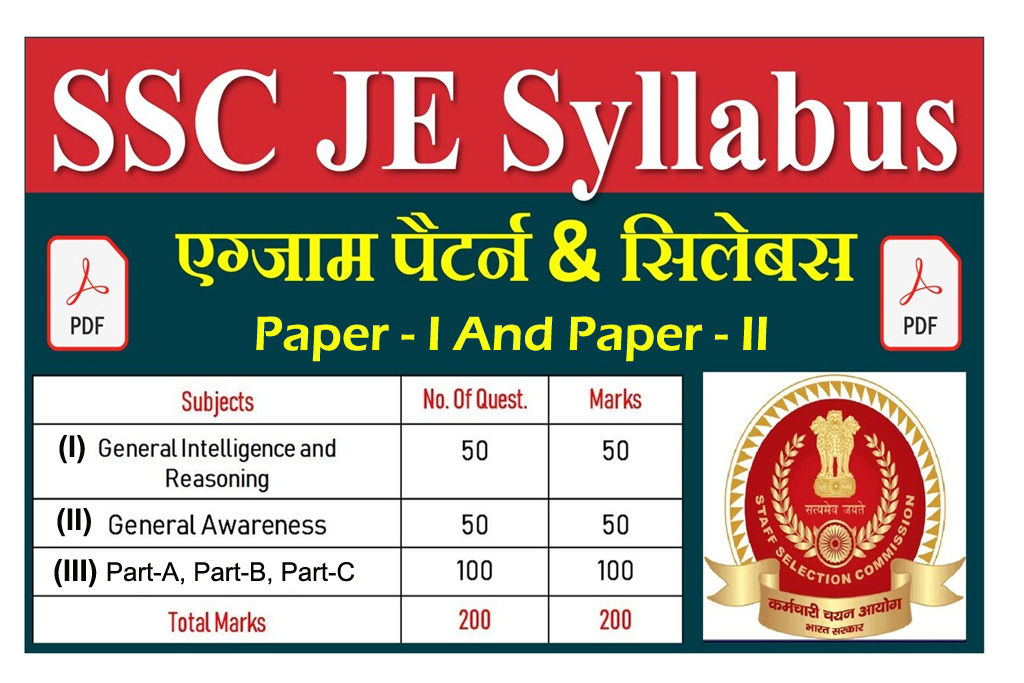
Important Dates
Selection Process :-
SSC JE Paper-I Exam Pattern 2024 :-
- Time Duration: 2 Hours
- Mode of Exam: Computer Based Examination CBT
- Negative Marking : 0.25 marks for each wrong answer in Paper-I.
SSC JE Syllabus Paper – I
For General Intelligence & Reasoning :-
- Analogy
- Coding-Decoding
- Paper Folding Method
- Matrix
- Word Formation
- Venn Diagram
- Direction and Distance
- Blood Relations
- Series
- Verbal Reasoning
- Non–Verbal Reasoning
- Seating Arrangement
- Puzzles & Seating Arrangement
for General Awareness
- Static General Knowledge
Science - Current Affairs
- Sports
- Books and Authors
- Important Schemes
- Portfolios
- People in the News
- History
- Culture
- Geography
- Economy
- Awards and Honors
for General Engineering (Civil and Structural), (Electrical & Mechanical):
Part-A: Civil Engineering
- Building Materials
- Surveying
- Estimating
- Soil Mechanics
- Costing and Valuation
- Concrete Technology
- Irrigation Engineering
8.Steel Design - Theory of Structures
- Hydraulics
- RCC Design
- Environmental Engineering
- Transportation Engineering
Part-B: Electrical Engineering
- Basic concepts
- Circuit law
- AC Fundamentals
- Magnetic Circuit
- Electrical Machines
- Utilization and Electrical Energy
- Transmission and Distribution
- Estimation and Costing
- Basic Electronics
- Generation
- Fractional Kilowatt Motors and single phase induction motors
- Measurement and measuring instruments
- Synchronous Machines
Part-C: Mechanical Engineering
- Theory of Machines and Machine Design
- IC Engines Combustion
- Air Standard Cycles for IC Engines
- IC Engine Performance
- 1st Law of Thermodynamics
- 2nd Law of Thermodynamics
- Boilers
- IC Engine Cooling & Lubrication
- Classification
- Rankine cycle of System
- Specification
- Engineering Mechanics and Strength of Materials
- Centrifugal Pumps
- Basic Principles & Classification of steel
- Hydraulic Turbines
- Dynamics of Ideal Fluids
- Fluid kinematics
- Measurement of Fluid Pressure
- Properties & Classification of Fluids
- Air Compressors & their cycles
- Refrigeration cycles
- Measurement of Flow rate
- Fluid Statics
- Nozzles & Steam Turbines
- Principle of Refrigeration Plant
- Fittings & Accessories
SSC JE Paper-II Exam Pattern 2024 :-
| Subject | Questions | Marks |
| Part-A: General Engineering (Civil & Structural) or Part-B: General Engineering (Electrical) or Part-C: General Engineering (Mechanical) | 100 | 300 |
SSC JE Paper II Syllabus 2024 For Civil Engineering (Part A)
SSC JE Syllabus For Civil Engineering
Building Materials :-
• Physical and chemical properties
• Classification, Standard Tests, Uses and Manufacture/Quarrying of Materials
Estimating, Costing, and Valuation :-
- Estimate, a glossary of technical terms, analysis of rates, methods and unit of measurement, Items of work – earthwork, Brick work (Modular & Traditional bricks), RCC work, Shuttering, Timber work, Painting, Flooring, and Plastering.
- Boundary wall, Brick building, Water Tank, Septic tank, Bar bending schedule, Center line method, Mid-section formula, Trapezoidal formula, Simpson’s rule.
- Cost estimate of Septic tank, flexible pavements, Tube well, isolates and combined footings, Steel Truss, Piles, and pile-caps.
- Valuation – Value and cost, scrap value, salvage value, assessed value, sinking fund, depreciation and obsolescence, methods of Valuation.
Surveying :-
- Principles of surveying, measurement of distance, chain surveying.
- Working on the prismatic compass, compass traversing, bearings, local attraction, plane table surveying.
- The theodolite traversing, adjustment of theodolite, Leveling, Definition of terms used in leveling, contouring, curvature, and refraction corrections.
- Temporary and permanent adjustments of dumpy level, methods of contouring.
- Uses of a contour map, tachometric survey, curve setting
- Earthwork calculation, advanced surveying equipment
Soil Mechanics :-
- Origin of soil, phase diagram, Definitions-void ratio, porosity, degree of saturation, water content, the specific gravity of soil grains, unit weights, density index, and interrelationship of different parameters, Grain size distribution curves, and their uses .
- Index properties of soils, Atterberg’s limits, ISI soil classification, and plasticity chart.
- Permeability of soil, coefficient of permeability, determination of coefficient of permeability, Unconfined and confined aquifers, effective stress, quicksand, consolidation of soils, Principles of consolidation, degree of consolidation, pre-consolidation pressure, normally consolidated soil, e-log p curve, computation of ultimate settlement.
- Shear strength of soils, direct shear test, Vane shear test, Triaxial test.
- Soil compaction, Laboratory compaction test, Maximum dry density and optimum moisture content, earth pressure theories, active and passive earth pressures, Bearing capacity of soils, plate load test, standard penetration test.
Hydraulics:-
- Fluid properties and hydrostatics, measurements of flow.
- Bernoulli’s theorem and its application.
- Flow-through pipes.
- Flow in open channels, weirs, flumes, spillways, pumps, and turbines.
Irrigation Engineering :-
- Definition, necessity, benefits, 2. II effects of irrigation, types, and methods of irrigation.
- Hydrology – Measurement of rainfall, runoff coefficient, rain gauge.
- Losses from precipitation – evaporation, infiltration, etc. Water requirement of crops, duty, delta and base period, Kharif and Rabi Crops, Command area, Time factor, Crop ratio, Overlap allowance, Irrigation efficiencies.
- Different types of canals, types of canal irrigation, loss of water in canals. Canal lining – types and advantages. Shallow and deep to wells, the yield from a well.
- Weir and barrage, Failure of weirs and permeable foundation, Slit, and Scour, Kennedy’s theory of critical velocity.
- Lacey’s theory of uniform flow.
- Definition of flood, causes, and effects, methods of flood control, water logging, preventive measures.
Transportation Engineering :-
- Highway Engineering: cross-sectional elements, geometric design, types of pavements, pavement materials
- Aggregates and bitumen, different tests, Design of flexible and rigid pavements
- Water Bound Macadam (WBM) and Wet Mix Macadam (WMM), Gravel Road, Bituminous construction, Rigid pavement joint, pavement maintenance, Highway drainage, Railway Engineering
- Components of the permanent way – Sleepers, ballast, fixtures and fastenings, track geometry, points and crossings, track junction, stations, and yards.
- Traffic Engineering – Different traffic survey, speed-flow-density, and their interrelationships, intersections, and interchanges, traffic signals, traffic operation, traffic signs and markings, road safety.
Environmental Engineering :-
- Quality of water, source of water supply, purification of water, distribution of water, need of sanitation, sewerage systems, circular sewer, oval sewer, sewer appurtenances, sewage treatments.
- Surface water drainage.
- Solid waste management – types, effects, engineered management system.
- Air pollution – pollutants, causes, effects, control.
- Noise pollution – cause, health effects, control.
For Structural Engineering (Part A)
SSC JE Syllabus For Structural Engineering
Theory of Structures :-
- Elasticity constants, types of beams – determinate and indeterminate, bending moment and shear force diagrams of simply supported, cantilever, and overhanging beams.
- Moment of area and moment of inertia for rectangular & circular sections, bending moment, and shear stress for tee, channel, and compound sections.
- Chimneys, dams and retaining walls, eccentric loads, slope deflection of simply supported and cantilever beams, critical load and columns, Torsion of circular section.
Concrete Technology :-
- Properties, advantages and uses of concrete, cement aggregates, the importance of water quality, water-cement ratio
- Workability, mix design, storage, batching, mixing, placement, compaction, finishing and curing of concrete.
- Quality control of concrete, hot weather and cold weather concreting repair, and maintenance of concrete structures.
RCC Design :-
- RCC beams-flexural strength, shear strength, bond strength, design of singly reinforced and double reinforced beams, cantilever beams.
- T-beams, lintels.
- One-way and two-way slabs, isolated footings. Reinforced brick works, columns, staircases, retaining walls, water tanks (RCC design questions may be based on both Limit State and Working Stress methods).
Steel Design :-
- Steel design and construction of steel columns
- Beams roof trusses plate girders.
SSC JE Syllabus 2024 For Electrical Engineering (Part B)
The standard of the questions in Engineering subjects will be approximately of the level of Diploma in Engineering (Civil/Mechanical/Electrical). The details of the syllabus are given below:
SSC JE Syllabus For Electrical Engineering
Basic Concepts :-
- Concepts of resistance, inductance, capacitance, and various factors affecting them.
- Concepts of current, voltage, power, energy, and their units.
- Circuit law: Kirchhoff‟s law, Simple Circuit solution using network theorems.
- Magnetic Circuit: Concepts of flux, mmf, reluctance, Different kinds of magnetic materials, Magnetic calculations for conductors of different configuration e.g. straight, circular, solenoidal, etc.
- Electromagnetic induction, self, and mutual induction.
AC Fundamentals :-
- Instantaneous, peak, R.M.S., and average values of alternating waves.
- Representation of sinusoidal waveform, simple series and parallel AC Circuits consisting of R.L. and C, Resonance, Tank Circuit.
- Poly Phase system – star and delta connection, 3 phase power, DC and sinusoidal response of R-Land R-C circuit.
Measurement and Measuring Instruments :-
- Measurement of power (1 phase and 3 phase, both active and re-active) and energy, 2 wattmeter method of 3 phase power measurement.
- Measurement of frequency and phase angle.
- Ammeter and voltmeter (both moving oil and moving iron type), the extension of range wattmeter, Multimeters, Megger, Energy meter AC Bridges.
- Use of CRO, Signal Generator, CT, PT, and their uses.
- Earth Fault detection.
Electrical Machines :-
- D.C. Machine – Construction, Basic Principles of D.C. motors and generators, their characteristics, speed control, and starting of D.C. Motors. Method of braking motor, Loss, and efficiency of D.C. Machines.
- 1 phase and 3 phase transformers – Construction, Principles of operation, equivalent circuit, voltage regulation, O.C. and S.C. Tests, Losses, and efficiency.
- Effect of voltage, frequency, and waveform on losses. Parallel operation of 1 phase /3 phase transformers.
- Autotransformers.
- 3 phase induction motors, rotating magnetic field, the principle of operation, equivalent circuit, torque-speed characteristics, and starting and speed control of 3 phase induction motors.
- Methods of braking, the effect of voltage, and frequency variation on torque speed characteristics.
Fractional Kilowatt Motors and Single Phase Induction Motors :-
- Characteristics and applications.
- Synchronous Machines – Generation of 3–phase e.m.f. armature reaction, voltage regulation, parallel operation of two alternators, synchronizing, control of active and reactive power.
- Starting and applications of synchronous motors.
Generation, Transmission, and Distribution :-
- Power factor improvement, various types of tariffs, types of faults, short circuit current for symmetrical faults.
- Switchgears – the rating of circuit breakers, Principles of arc extinction by oil and air, H.R.C. Fuses, Protection against earth leakage / over current, etc. Buchholtz relay, Merz-Price system of protection of generators & transformers, protection of feeders and bus bars.
- Lightning arresters, various transmission and distribution systems, comparison of conductor materials, the efficiency of the different systems.
- Cable – Different types of cables, cable rating, and derating factor.
- Different types of power stations, Load factor, diversity factor, demand factor, cost of generation, inter-connection of power stations.
Estimation and Costing :-
- Estimation of lighting scheme, electric installation of machines, and relevant IE rules.
- Earthing practices and IE Rules.
Utilization of Electrical Energy :-
- Illumination
- Electric heating
- Electric welding
- Electroplating
- Electric drives and motors.
Basic Electronics :-
- Working on various electronic devices e.g. P N Junction diodes, Transistors (NPN and PNP type) BJT, and JFET.
- Simple circuits using these devices.
SSC JE Syllabus 2024 For Mechanical Engineering (Part C)
SSC JE Syllabus For Mechanical Engineering :-
Theory Of Machines and Machine Designs :-
- Concept of a simple machine, Four bar linkage and link motion, Flywheels, and fluctuation of energy
- Power transmission by belts – V-belts and Flat belts, Clutches – Plate and Conical clutch, Gears –Type of gears, etc.
Engineering Mechanics and Strength of Materials :-
- Equilibrium of Forces, Law of motion, Friction, Concepts of stress and strain, Elastic limit.
- Elastic constants, Bending moments and shear force diagram, Stress in composite bars, etc.
Thermal Engineering :-
- Properties of Pure Substance1st & 2nd Law of Thermodynamics
- Air standard Cycles for IC Engines.
- Rakhine Cycle of steam
- Boilers
Fluid Mechanics Machinery :-
- Properties & Classification of fluid
- Fluid Statics
- Measurement of Fluid Pressure
- Fluid Kinematics
- Dynamics of Ideal Fluids
- Measurement Of Flow Rate Basic Principles
- Hydraulic Turbines
- Centrifugal Pumps
- Classification Of Steels
Important Link:-
| Officail Notification | Download Now |
| Official Website | Click Hare |
| Telegram Join Link | Click Hare |
FAQs
966 Posts
The standard of the questions in Engineering subjects will be approximately of
the level of Diploma in Engineering (Civil/Mechanical/Electrical). The details
of the syllabus are given below:

